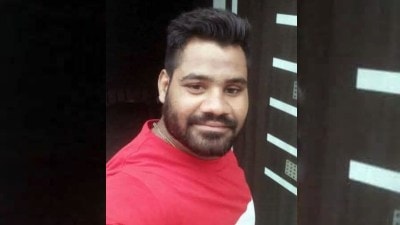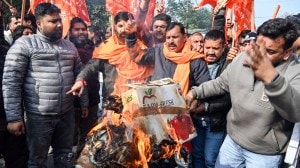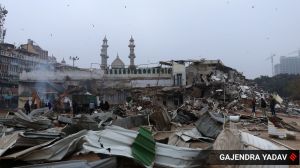After bin Laden
What does the killing of Osama bin Laden mean for India and Pakistan and for the security of the subcontinent?
Pak-US: Will ties be recast?
EJAZ HAIDER
The US Special Forces raid inside Pakistan that killed Osama bin Laden will have a major impact on Pakistan-US relations. Thats an obvious. The incident has made Pakistan lose space to the Americans,and the embarrassment it now faces,internally and externally,means Islamabad will reconsider many contours of the existing relationship.
Until just a day before May 1,the Pakistani military had an upper hand in the game that is being played in the region. That,in some ways,has changed and the narrative that attends the bin Laden incident serves to bring the military under pressure.
It is a matter of deep resentment for the military that regardless of what Pakistan does,when it comes to a spectacular event,the narrative immediately moves towards taking a snapshot view of the situation rather than applying a longitudinal design to understand what is going on. For instance,in raising questions over bin Ladens presence in Abbottabad,no one seems to focus on the fact that since 2002 the Inter-Services Intelligence has captured more al Qaeda terrorists than all other intelligence agencies combined.
Indeed,it is deeply ironic that Abu Faraj Al-Libbi,one of the main sources used by the Central Intelligence Agency to get to bin Ladens courier whose surveillance led them to Abbottabad,was captured by the ISI from Mardan. He was handed over to the Americans after initial interrogation.
There is also a sense now that while Pakistan was more forthcoming in sharing progressive intelligence with CIA,the latter was running its own efforts and after getting the earlier leads,kept the ISI in the dark about how it was maturing the leads. There is likely to be a major rethink on what is to be shared now with the Americans.
The question about how the Americans could get to bin Laden while the ISI could not tends rather overtly,and for the most part deliberately,to express the possibility of complicity. If this line of argument is accepted then we must also accept that the military connived to get its own men,officers and jawans,maimed and killed at the hands of al Qaeda and its affiliatesTTP,LeJ,JeMeven as it was hosting bin Laden. At the minimum it should have been able,going by this argument,to ensure that no attacks are launched on its assets.
Neither should there have been more than two dozen attacks on the ISI itself which have resulted in over 200 casualties. Also,it would stretch credulity to breaking point that while hosting bin Laden,the ISI would be going around capturing al Qaeda men and handing them over to America so the Americans could extract information that would lead them right back to bin Laden.
And if bin Laden was operationally useless it made no sense to keep him. By capturing or killing him,the Pakistani military would have acquired a much stronger position for itself in the larger game.
Meanwhile,the raid itself has thrown up a paradox. What should be the response of the military? Statements have come out implying that something like this can be repeated,not just by America but also India. Dispelling this is one of the most important concerns for the military at this stage. It is important to understand that retaliation depends on what options can be exercised and which one of them can be sustained. A good way of understanding the issue would be to raise a hypothetical question: what options would the Pakistani military have if the Americans had raided another target,anything short of bin Laden?
It should be clear that the space to react against America,directly or indirectly,would have been much more than was provided by this case; to think that any other state could employ a similar strategy and go unpunished would be a huge miscalculation. However,the military needs to make such a response credible. That would be another area where Pakistan would review certain policies and the extent and nature of cooperation with the United States to regain lost space.
The major downside of the American raid is that it has brought into open,and sharp focus,the distrust between Pakistan and the US. The Pakistani response and review will have to factor this in. To that extent a tactical win for the US may result in a strategic loss. Statements by US officials that relations with Pakistan transcend the bin Laden moment do not serve to heal the wound America has inflicted and this will be reflected in relations beyond this point. There will be greater pressure on Pakistan which the latter will have to counter through a combination of strategies.
There are areas of convergence of course and there will be cooperation. But equally,tension in areas of divergence is going to increase. The raid,a tactical operation,will end up having strategic consequences for both sides.
The writer is Contributing Editor,The Friday Times,Lahore
Why the hardliners wept for Osama
MUZAMIL JALEEL
Days after a US Navy SEAL team raided a compound in Abbottabad and killed al Qaeda chief Osama bin Laden,Jamaat-ud-Dawa,a charity on the US terror blacklist for its links with Lashkar-e-Toiba,organised funeral prayers for bin Laden,calling him a martyr.
The Pakistani Taliban has already vowed to avenge Osamas killing. Kashmirs hardline Islamist leader Syed Ali Shah Geelani too called Osama a martyr,criticised United States for drowning his body in sea and led special funeral prayers in Srinagar. In Pakistan,the Islamists have raised the jihad pitch.
Though the anger of the Islamists in Pakistan or the special prayers for Osama do not exhibit the operational links between al Qaeda and the jihadi groups in Pakistan,the killing of bin Laden and the mysterious circumstances surrounding the US operation has given Osama a status,almost mythical,among jihadis. Apart from ideological compatibility with bin Ladens war,the public support for Osama has,in a way,become the litmus test for the jihadi credentials of Islamists.
There is serious likelihood that the al Qaeda may finally see an ideological shift with Ayman al-Zawahiri taking over the leadership of al Qaeda,with the members of his Egyptian Islamic Jihad forming the core of the top executive council or Shoura. While bin Laden came from the Salafi school of thought,Zawahiris ideological moorings are grounded in his time with Ikhwan-ul-Muslimoon Muslim Brotherhood. With bin Ladens disappearance from the leadership scene,there is every likelihood that al Qaedas dominant ideology may shift away from the Salafi school of thought. Whether this possible shift will drastically change al Qaedas alliances within Af-Pak is too early to predict,especially as the Osama-led group had strategically forged a closer alliance with both Mullah Omars Taliban and later Pakistani Talibanand not Lashkar-e-Toiba,which is the only jihadi group in Pakistan with strong Salafi credentials.
In his book,Storming the World Stage: The Story of Lashkar-e-Taiba,Stephen Tankel,a visiting scholar at the Carnegie Endowment for International Peace,writes,When bin Laden returned to Afghanistan from Sudan in 1996,he did not have a relationship with Taliban leaders and initially lived under the protection of the Jalalabad Shura. By this time the Taliban8230;was clearly on the ascent and after it took Kabul and Jalalabad in September 1996,bin Laden began the process of ingratiating himself with the movements leadership. He did this in spite of his own Salafi beliefs for the very pragmatic reason that the Taliban controlled the capital along with most of the country and al-Qaeda was in need of safe haven.
Lashkar story
In 1983,two Pakistani professors,Hafiz Mohammad Saeed and Zafar Iqbal,formed the Markaz-al-Dawa wal-Irshad MDI,a group to propagate religious teachings. Both Saeed and Iqbal had studied briefly in Saudi Arabia before returning to Pakistan. Around the same time,top Lashkar commander and an accused in 26/11,Zaki ur Rehman Lahkvi,had travelled to Afghanistans Paktia province to join the Afghan jihad.
Like Saeed and Iqbal,Lakhvi too was an ardent believer in the Salafi school of thought. As no Salafi Afghan outfit was engaged in the war against the Soviets,Lakhvi joined a Deobandi group but soon parted ways. Meanwhile,Saeed too wanted to join Afghan jihad and finally came together with Lakhvis small jihadi outfit to launch Lashkar with MDI as its parent religious and social organisation. This was the time when Osamas mentor and father of modern global jihad,Abdullah Azzam,had already left his teaching job in Saudi Arabia to help in Afghan jihad. Saeed and Iqbal worked closely with Azzam. Soon,MDI had become the only South Asian Salafi organisation with a jihadi agenda.
In 1987,Lashkar set up its first training camp in Paktia province which was followed by another centre in Kunar. But by the time the first large batch of militants graduated from Lashkars training centres,the Afghan jihad was already over. This is exactly the time when Kashmir was exploding and soon Lashkar made its first entry into the Valley.
Lashkar8217;s only established link with al Qaeda is the use of Lashkars safe houses by several top al Qaeda members. In March 2002,Abu Zubayda was arrested from an alleged Lashkar safe house in Faisalabad.
Tankel concludes that the relationship between Lashkar and the al Qaeda has been complicated because of their respective alliances. Lashkar is hostile to al Qaedas close Deobandi allies,and al Qaeda is wary of working too closely with Lashkar because it is considered to have remained close to the ISI, Tankel writes.
In contrast,the Taliban both Afghan and Pakistani as well as other jihadi groups with Deobandi ideology have openly waged a war with the Pakistani government for their alliance with the Americans.
Paks anti-terror policy
Till the American raid in Abbottabad,Pakistan had deliberately allowed a dichotomy in its counter-insurgency strategy and successfully managed to separate Western,especially US,interests from Indias concerns. While the Pakistani Army has been confronting the groups that are openly aligned with al Qaeda and fight the US-led alliance in Afghanistan,it has avoided taking on jihadi groups that focus on Kashmir. The reason is simple: Kashmir has traditionally been a major influence on Pakistans domestic as well as foreign policy and an outright crackdown on anti-India groups would change the very dynamics of Pakistans anti-terror policy. Though Pakistan government did launch a crackdown after the Parliament attack of 2001,it insisted that this shift does not mean abandoning its support to separatists in Kashmir.
There is another important aspect to this dichotomy. The Taliban movement in Afghanistan and Pakistan is primarily based on the Deobandi school of thought while Lashkar is Salafi. While Deobandis in Pakistan seek the establishment of an Islamic State in its letter and spirit and even favour a jihad against the establishment itself,the Salafis do not support rebellion against the government in a Muslim country and rather advocate reform to turn the ruling elite into Muslims at heart. This means that the Lashkar or its parent organisation,the Markaz-al-Dawa wal-Irshad,was never a security risk for the Pakistani state within the country.
In fact,this Salafi group was in absolute conformity with Pakistans policy till 9/11 blurred the line dividing armed movements and terrorism internationally. This is precisely why Musharrafs decision to ban Lashkar was seen as a major step.
Almost a month ahead of Pakistans ban on Lashkar,Hafiz Mohammad Saeed called a press conference on December 24,2001 and officially distanced himself from Lashkar,closed down MDI and instead set up Jamaat-ud-Dawa with an exclusive aim to dawah preaching and charity.
Lashkar was officially confined to Azad Kashmir and Moulana Abdul Wahid Kashmiri was chosen as its new leader to give it an indigenous Kashmiri character while Zaki-ur-Rehman Lakhvi became the Lashkar8217;s supreme commander. The 26/11 attacks,however,brought new focus on both Lashkar and Jamaat-ud-Dawa. Though the diplomatic pressure mounted by New Delhi,along with US pressure to act against the Lashkar,did corner Pakistan briefly but the American focus on al Qaeda and Taliban changed the situation soon. In fact,the latest statement from United States making a clear distinction between 9/11 and 26/11 too shows that the groups fighting India are still not very high on American priority.
Though Hafiz Saeed and his Jamaat-ud-Dawa have now publicly called bin Laden a martyr,the USs focus towards Lashkar will depend on how the al Qaeda after Osama regroups in Af-Pak and also on the nature of the relationship between Lashkar and al Qaeda.
For India,an opportunity
C. Raja Mohan
Three decades ago,the arrival of Osama bin Laden on the subcontinent worsened Indias security environment,making it one of the biggest victims of international terrorism and putting it at the receiving end of hostile regional alliances and nuclear blackmail.
Could Osamas death at the hands of the US Special Forces last week begin a slow but certain change for the better? Can India find a way out of the box that it has been caged in for so long?
India was certainly not the top priority in Osamas global jihad. He had other fish to frythe United States,the West,Israel and Saudi Arabia to name a few. Yet,Osamas ideology,the partnerships he built in the region and the secure bases he established in Afghanistan and Pakistan,severely impaired Indias ability to manage,let alone control its security environment.
The death of Osama certainly marks the end of an important phase in the strategic history of our region when the negative trends from Pakistan and Afghanistan gained ground.
Whether Osamas death leads to a period of stability or yet another round of blood-letting,will depend on a number of objective factors and Indias own ability to intervene and shape the events.
On the ideological front,Osamas advocacy of a caliphatethat would construct an imagined pure land of Islamand his emphasis on extreme violence using mass murder as the instrument to achieve that goal have indeed inspired many around the world.
While he did not make much headway in the Middle East,Osama leaves a disastrous trail in the subcontinent. Thanks to the Pakistan Armys strategy of using religious extremism and terrorism as instruments of state policy,a culture of violence,sectarian hatred and religious intolerance have taken root in the region.
The impact of these forces is the deepest in Pakistan,but its influence in India and Bangladesh has been significant. They can be traced back to the turn of the 1980s,when Osama joined the jihad against the Soviet occupation of Afghanistan,funded and equipped by the US and Saudi Arabia,and orchestrated by the ISI. Complementing this brutalisation of South Asia was the injection of religion into the political life of Pakistan by Gen Zia ul Haque.
Leveraging his role in Afghanistan against the Soviet Union,Zia developed a clandestine nuclear weapon programme with the full confidence that the US dare not stop him. This in turn provided Pakistan with a solid shield from behind which it could throw its extremist assets against India and promote global jihad with impunity.
After ousting the Soviet Union from Afghanistan at the end of the1980s,Osama headed back to Saudi Arabia trying to launch a new global jihad with techniques developed in Afghanistan.
Unable to find a sanctuary in the Middle East or Africa,Osama was invited back to Afghanistan in the mid 1990s by the Pakistan Army which was launching the Taliban to gain control of Afghanistan.
This triangular alliance between Talibans Mullah Omar,Osama bin Laden who would run the al Qaeda from the safe havens in Afghanistan,and the ISI unleashed some of the worst evil the world has known.
The 9/11 attacks on the United States brought Washington in a very different role to the regionthis time to break the evil alliance. Pakistans double dealing,however,all but rendered American objectives impossible to achieve,at least until last Monday.
The successful American raid on Osama deep inside Pakistan,on the face of it,should help begin the roll-back of all the negative trends that the Pakistan Army,Osama and the Taliban have spawned in the regionviolent extremism to the politics of nuclear blackmail.
While the United States has been energised by the killing of Osama and has gained a temporary upper hand over the Pakistan Army,it is not clear if Washington has the staying power and the determination to go after the Pakistan military.
After the initial anger at the Pak Armys double dealing,there is influential sentiment in Washington to declare victory and get out. There are others who think indulging the Pak Army is the only way forward in the region. And then there are those who think the US must seize the moment to drain the swamps of terror in Pakistan.
While the situation remains fluid,India must be prepared to take advantage of the new opportunities that arise from the death of Osama,prevent new hostile alliances in the region,and deflect the negative trends that cant be nipped in the bud.
Central to the achievement of these objectives is the effective management of Indias bilateral dynamic with Pakistan,building new regional coalitions that can cope with the withdrawal of international forces from Afghanistan and constrain Rawalpindis objectives in Afghanistan,and an active engagement of the major powers,including the United States and China.
India has more options and resources now than three decades ago when Osama showed up at the Hindu Kush. Delhis challenge is to find the necessary political will and diplomatic skill to translate them into effective political interventions in Afghanistan and Pakistan.
US has to ensure that al Qaeda does not come back
In an email interview with Manu Pubby,Stephen P. Cohen,an expert on South Asian political and security issues,talks
about what the US operation means for Pak military
Does the fact that Osama bin Laden was hiding under the nose of the Pakistani military indicate that it is losing its grip on the nation?
There is some evidence that they were critically important in helping the US track him,and that they did not want to claim a role,lest they become the object of Islamist wrath. This way,they also let Obama get the credit. But an opposite theory is that they have already lost control,and are afraid to confront the extremist monster. I wait for more evidence,but both theories are scary.
With bin Laden dead,is the US likely to accelerate its withdrawal from Afghanistan?
I doubt we will accelerate,we will have a hard time figuring out how to get out gracefully. In any case,the intention is to leave some forces behind to ensure that the al Qaeda does not come back.
Is it likely that both the Pakistani Army and the ISI did not know about bin Ladens presence in Abbottabad?
One view is they grabbed him when he rotated to this house,that it took a long time to get this kind of intel access,and that the US could not have done it. Another theory is that they were guilty of not knowing,and if they did know,of covering up.
There have been reports that Pakistan is fearing a US attack on its nuclear installations. Is this far fetched?
Totally silly,and not possible without massive loss of weapons or fallout.
Should India raise the decibel now to prompt Pakistan to take more steps against terrorism?
It should offer inducements to get Pakistan to stop harbouring these groups. But can an Indian government do this now? I doubt it.
Your thoughts on the kind of retaliation that Pakistan and possibly India will face from al Qaeda.
It will be tough on the Pakistanis,theyve been hit hard. But this is in part their doing,even if the US had a role in fuelling the monster. And India has not helped by its tough stance on normalisation.
- 01
- 02
- 03
- 04
- 05































